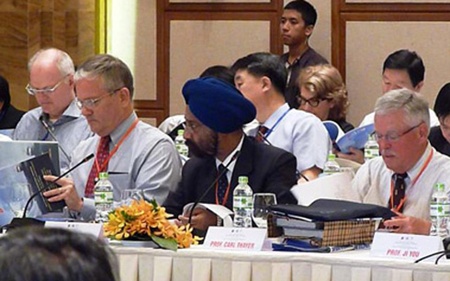
"There are different opinions on stability in the East Sea and ways to solve tensions in the area, but recommendations on co-operation among countries have yet to be deployed," Nguyen Van Quyen, chairman of the Viet Nam Lawyers' Association, told the sixth South China Sea (East Sea) International Conference held in the central city of Da Nang.
Highlighting some of the problems created by the dispute, he said: "Seafood production has declined, and the status quo in the East Sea has gradually changed."
Quyen said the international community has asked concerned parties to settle the disagreement through peaceful measures in line with international law, namely the 1982 United Nations Convention on the Law of the Sea (UNCLOS) and the Declaration on the Conduct of Parties in the East Sea (DOC).
Work also needed to be one on completing a Code of Conduct (COC) in the East Sea, he said.
 |
| The sixth South China Sea (East Sea) International Conference opens in the central city of Da Nang |
Quyen said discussions between ASEAN and China on the DOC and COC have made progress, with more initiatives proposed to boost implementation of the former.
Despite tensions in the East Sea, relationships among concerned countries have stayed positive, he said.
Tourism, fisheries affected
Van Huu Chien, chairman of the Da Nang People's Committee, said tensions in the East Sea in May had reduced the number of visitors and investors to the area, and hurt the fisheries industry.
The city, which receives the highest number of foreign tourists from China, saw arrivals plunge 90 per cent one month after it illegally placed the Haiyang Shiyou-981 drilling rig in Viet Nam's exclusive economic zone and continental shelf on May 2.
The number of tourists from Singapore, the United Kingdom, the United States and France as well as Japan also saw a five to 10 per cent decline, Chien said.
Myint Thu, deputy director general of Myanmar's ASEAN affairs department, said scholars, experts and scientists should meet more often and discuss ways to promote socio-economic development and stability in the East Sea.
Other officials at the meeting also said stability in the East Sea was important for regional economic development.
"Despite differences among member countries, stability, safe navigation and prosperity in the East Sea are major concerns for all ASEAN members," said Mayerfas, the Indonesian Ambassador to Viet Nam.
Myint Thu said he was optimistic that more progress will be seen at the conference towards solving the East Sea dispute as well as in talks between concerned nations, ASEAN and China."
This year's conference, hosted by the Diplomatic Academy of Viet Nam and the Viet Nam Lawyers's Association, aimed to create a space for scholars to exchange views on recent tensions in the East Sea and come up with recommendations for keeping the area stable and peaceful.
Titled Co-operation for Regional Security and Development, the event has drawn more than 150 scholars, experts, researchers and speakers from Australia, India, the US, China, Japan, France, Chinese Taipei, Korea, Belgium, Russia, the UK, Italy, Canada, Singapore, Malaysia, Myanmar, the Philippines, Brunei, Cambodia, Indonesia and Viet Nam.
The conference ends today.






- Vietnam condemns violence by Chinese authorities in Hoang Sa
- Hanoi set to pilot centralized government services
- Vietnam National Day: Insights from expats
- Musical featuring the Spratlys to be aired
- Countries recognize Vietnam’s right to claim extended continental shelf in UN submission
- Vietnam submits limits of continental shelf beyond 200 nautical miles in respect of the East Sea's Central area
